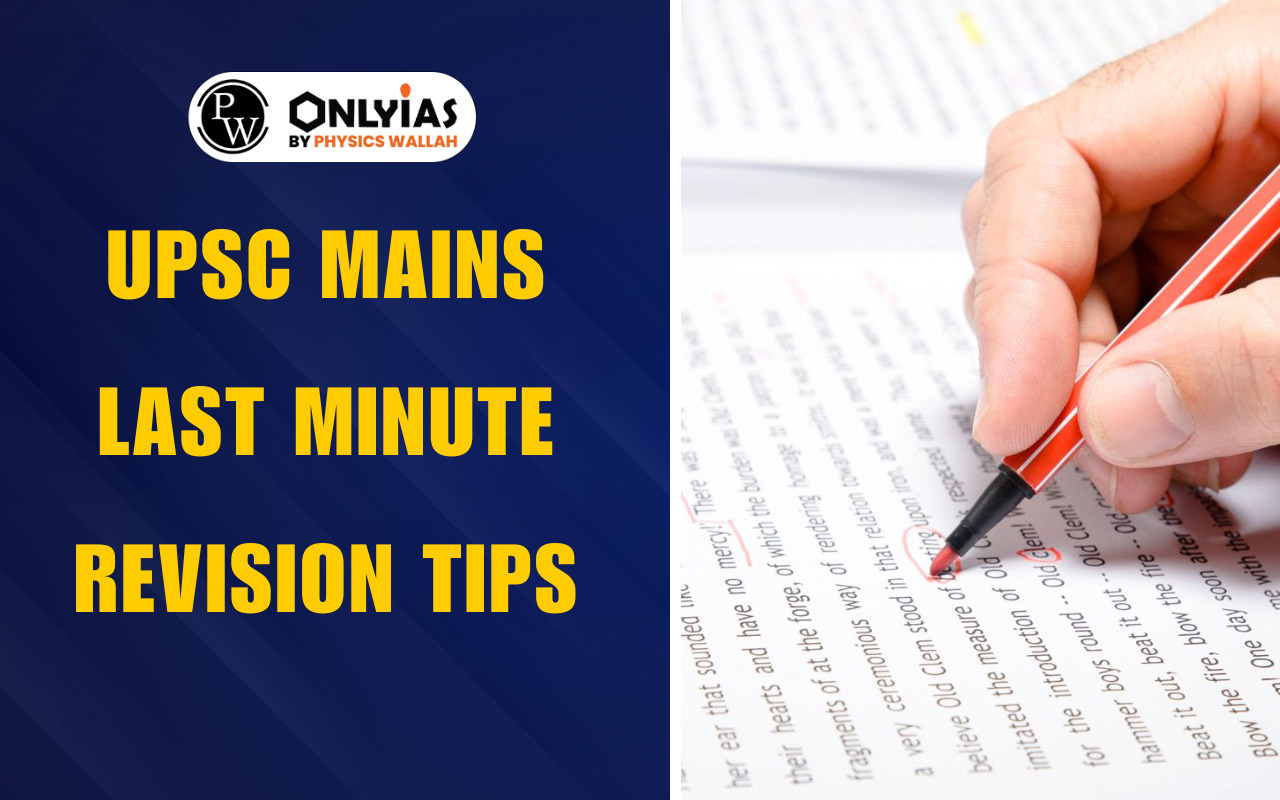UPSC Mains Last Minute Revision Tips 2026: Boost your preparation with smart strategies, high-yield topics, answer writing practice, current affairs, and effective time management. These last-minute tips will help aspirants stay focused, revise faster, and maximize performance in the exam.

UPSC Mains Last Minute Revision Tips: Preparing for the UPSC Civil Services Mains exam 2026 can be an overwhelming experience, especially as the exam date approaches. However, with effective last-minute revision strategies, you can enhance your chances of success. Candidates who are appearing for the UPSC Mains 2026 must boost their last-minute preparations. Here we have provided you with comprehensive UPSC Mains last-minute revision tips, focusing on how to maximise your study time and optimise your preparation.
The UPSC Mains Exam 2026 marks the second and most significant phase of the Civil Services Examination. It evaluates candidates’ intellectual depth, analytical ability, and grasp of wide-ranging subjects through nine descriptive papers. Scheduled to begin on August 21, 2026, the Mains stage is essential for shortlisting candidates for the Personality Test (Interview). Serious aspirants must align their preparation with the official syllabus and focus on answer-writing practice to qualify for this phase.
| UPSC Mains Exam 2026 Overview | |
|---|---|
| Category | Details |
| Exam Name | UPSC Civil Services Examination 2026 |
| Conducting Body | Union Public Service Commission (UPSC) |
| Purpose | Recruitment for IAS, IPS, IFS, IRS, and other Group A & B services |
| Stages of Examination | Prelims, Mains, Personality Test (Interview) |
| UPSC Mains Exam Date 2026 | August 21, 2026 (onwards) |
| Interview Date | Likely January–April 2027 (Tentative) |
| Exam Mode | Offline (Pen and Paper) |
| Prelims Exam Pattern | 2 Objective Papers: • Paper 1: General Studies (200 marks) • Paper 2: CSAT (Qualifying, 200 marks) |
| Mains Exam Pattern | 9 Descriptive Papers: • Essay • GS Papers I–IV • Optional Subject Papers I & II • Language Papers |
| Optional Subjects | Over 48 optional subjects (e.g., History, Geography, PSIR, Sociology) |
| Language Medium | English and Hindi (for Mains papers and Interview) |
| Result Announcement | After Interview |
| Syllabus Highlights | Prelims: General Studies, Current Affairs, CSAT Mains: Essay, GS Papers, Optional, Ethics |
| Exam Duration | Prelims: 2 hours/paper Mains: 3 hours/paper |
| Official Website | www.upsc.gov.in |
Last-minute revision is important because it helps support the concepts you’ve studied over months of preparation. It allows you to refresh your memory, identify weak areas, and fine-tune your exam strategy. With the vast UPSC syllabus 2026, it’s essential to have a clear plan to ensure that you cover all important topics before the UPSC Exam Day 2026.
Know More: Penalty Marks in UPSC Mains Exam 2026
Last-minute revision for the UPSC Mains exam 2026 requires careful planning and strategic execution. By focusing on high-yield topics, practising answer writing, and staying calm, you can optimise your performance and increase your chances of success. Remember, effective revision is about quality, not quantity, so make sure you use your time wisely in the final days leading up to the exam.
Physics Wallah’s course is structured to provide you with everything you need to excel in your UPSC Mains, even if you’re starting your focused revision just one month before the exam.
Ready to boost your UPSC 2026 preparation? Join PW’s UPSC online courses today!
Focus on high-yield topics like Current Affairs, Indian Polity, Economy, Geography, and Ethics. Revising these areas thoroughly can help cover a significant portion of the exam syllabus.
Create a focused revision schedule, prioritize key topics, and include regular breaks. Time management is crucial, so ensure you allocate time to practice answer writing and revise personal notes.
Yes, taking full-length mock tests can help build stamina, improve time management, and identify weak areas that need last-minute revision. Analyze your performance after each test to make necessary adjustments.
Prioritize revising key concepts and frequently asked topics in your optional subject. Review past years' question papers and focus on areas where you are less confident.
Practice deep breathing, meditation, or short walks to manage stress. Maintaining a healthy routine with proper sleep and a balanced diet can also help keep you calm and focused.
<div class="new-fform">
</div>